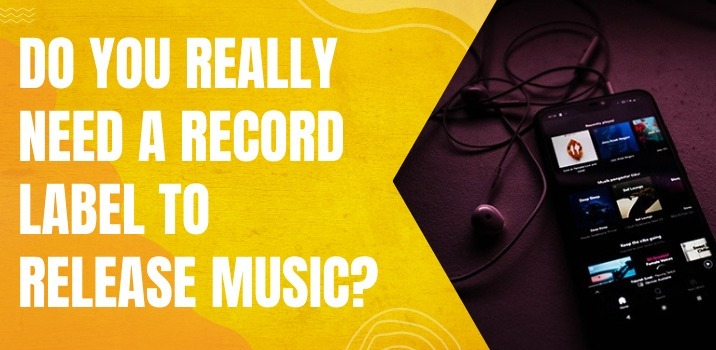Do you really need a record label to release music?

29-April-2024
The function of record labels in the music industry has been a hotly debated subject. Record companies have historically acted as gatekeepers, managing the creative process, release, and marketing of music. However, independent music artists now have more resources to release music on their terms. It is possible because of the development of digital technologies and the internet. Thus, the question now arises: Is a record label truly necessary for the release of music? The answer is ‘No’. Independent music artists now have more options to release their music without a record label. This has been possible due to the democratization of music production and distribution. Below, we explore why you don’t need a record label to release music.
Digital Distribution Platforms One of the most significant game-changers for independent artists is the proliferation of digital distribution platforms.Artists no longer require the consent or assistance of record labels to release their music directly to streaming services like Spotify, Apple Music, and Amazon Music. With the help of user-friendly and reasonably priced platforms like DistroKid, TuneCore, and CD Baby, music artists can easily upload their music, schedule releases, and get royalties. Independent artists are now able to reach a worldwide audience while retaining creative control over their work thanks to the democratization of distribution. Without depending on conventional industry institutions, music artists may now efficiently promote their albums, grow their fan base, and pursue a sustainable career thanks to the growth of social media and digital marketing tools.
DIY Music Production Gone are the days when expensive studio time was a barrier to entry. Today, affordable recording equipment and software enable artists to produce professional-quality music from the comfort of their homes. With powerful tools for music creation, mixing, and mastering, platforms such as Logic Pro, FL Studio, and Ableton Live give artists full creative control. Moreover, anyone attempting to navigate the complexities of music creation can benefit greatly from the help and direction offered by online forums and courses. Through circumventing conventional recording studios and label agreements, artists maintain creative independence and a greater portion of their revenue. With this newfound independence, artists may now explore a wide range of genres, release music on their schedules and engage directly with fans via social media and digital channels. Self-produced music allows music artists to flourish on their own in the music industry.
Marketing and Promotion Another factor why record labels are no longer required for the release of music is due to the easy methods for marketing and promotion. Through the use of social media sites like YouTube, Instagram, and TikTok, music artists may build a devoted fan base by posting interesting content, behind-the-scenes photos, and song clips. Digital advertising networks like Google Ads and Facebook Ads also provide tailored marketing choices for reaching particular demographics and growing their fan base. Furthermore, without the support of labels, visibility can be obtained through influencer partnerships, podcast appearances, and music blogs. Independent music artists can sell items directly to their fans, create buzz, and increase streams by utilizing various marketing tools. By fostering stronger ties and granting artists greater autonomy over their work and financial gain, the direct-to-fan model renders record labels increasingly obsolete in the context of music release.
Creative Freedom Perhaps the most cherished aspect of independence is creative freedom. Without the constraints of a record label's demands, artists can explore their artistic vision fully. With reasonably priced recording gear and software, music artists can create studio-caliber music in the comfort of their own homes while maintaining complete creative control. In addition, websites such as SoundCloud, Bandcamp, and Spotify provide direct routes of distribution, making it simple for music artists to make their music available to a worldwide audience. Through creative autonomy, music artists get several benefits. These include establishing deeper connections with their fan base, fostering specialized communities, and establishing long-term careers at their own pace. Record labels are no longer a need for releasing music to the public in this age of artistic freedom.
Conclusion
The necessity of a record label for music release has significantly diminished in the digital age. Independent artists have access to digital distribution platforms, can produce music independently, leverage social media for marketing, and enjoy unparalleled creative freedom. While record labels may still offer certain advantages, such as financial backing and industry connections, they are no longer a prerequisite for success in the music industry. Aspiring music artists can chart their path, empowered by the democratization of music production and distribution.